Marcel van Marrewijk's Blog, page 132
March 13, 2017
How Serendipity can benefit Entrepreneurs?

For both the new and the more experience entrepreneurs, having a big network is gold. Network is not only customers but also a support net. When you start your life as an entrepreneur you are by yourself. It is freeing, frightening and it can be either lonely or get you into a whole new world of people. That’s where the serendipity gets in.
Connect. Improve. Grow.
By now you probably heard that everyone is living in a bubble. Their own bubble formed by algorithms that only show you what you want to see. That might trick you and change your perception of the world around you, which can be a risk when creating new services and products. Serendipity is unexpected and it’s relevant. Meeting someone that is not in your circle can bring a lot of important insights and fresh ideas. It is important to be open to other visions of the world and to change in order to grow. You might end up finding more opportunities then you originally thought.
Connect. Collaborate. Grow.
More people than ever before are looking for life quality and purpose instead of a millionaire salary. That means that there are way more people risking their safe job to become an entrepreneurs or freelancer. Now what we are learning is that the rise on this number shouldn’t be seen as more competition for entrepreneurs, but more people to collaborate with. Serendipity has a big role in collaborating once is all about connecting to new and relevant people! People that can help you grow. This is the secret – tell everyone!
Connect. Share. Grow.
Serendipity benefits entrepreneurs in all its phases, including wannabe entrepreneurs, like myself. Connecting to other people who have been there is essential. Sharing experiences, ideas and thoughts can make the lonely part become more being part of something bigger while choosing your own role in it. In Society 3.0 we see movement of decentralisation. For an instance Airbnb is the biggest hotel chain without owning a hotel, or Uber has the biggest car fleet without owning a single car. We see a trend for the network of entrepreneurs becoming the biggest company in the world as they work together towards the same goals, doing their own thing. In that way it doesn’t seem so lonely right?
Connect & grow
The connect and grow part is bigger than one entrepreneur, although it is also important individually. Connecting and growing goes to the bigger picture as well. Goes towards the society 3.0.
To know more about working with Serendipity go to the Serendipity Machine.
The post How Serendipity can benefit Entrepreneurs? appeared first on Seats2meet.
KRACHTAVOND
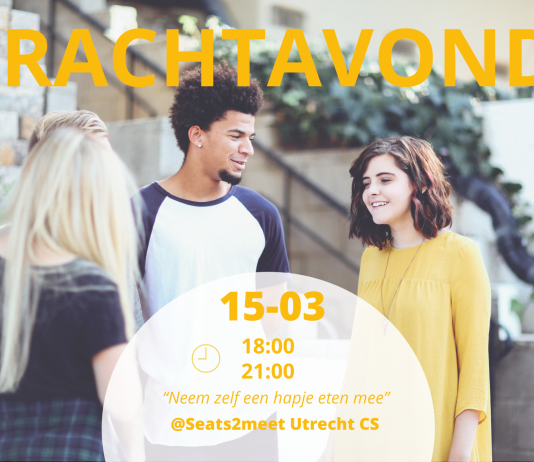
EVENT AS. WOENSDAG 15 MAART.
18:00 – 21:00
Kennis delen, elkaar ontmoeten en inspireren! Een get-together van nieuwkomers, bedrijven, freelancers en zoekende. Een leuke bijeenkomst bij Seats2meet Utrecht CS! Culturen, eten, netwerken en ontmoeten in 1 avond.
In samenwerking met Taal doet meer en Seats2meet for Locals organiseren we bij Seats2meet 15 maart een gezellige open (gratis) avond waarbij ontmoeten centraal staat.
Als ijsbreker vragen we iedereen een klein hapje mee te nemen! Dus gooi je creativiteit in de strijd (of er zit een AH naast Seats2meet op Hoog Catharijne…)
Ken jij mensen die hier bij zouden moeten zijn? Of lijkt het je zelf leuk om inspiratie op te doen, je netwerk te verbreden? Wees erbij!
Meer info: Nynke@seats2meet.com
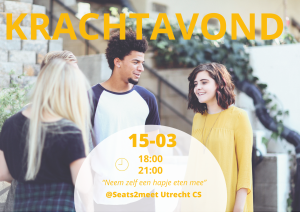
The post KRACHTAVOND appeared first on Seats2meet.
DE NIEUWE LINKEDIN LAYOUT – DE RECORDING VAN HET WEBINAR
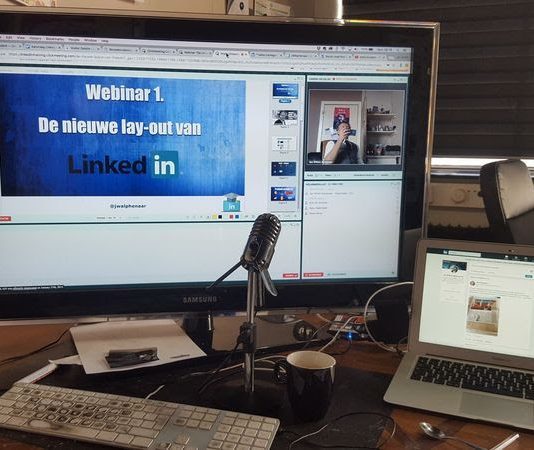
Vanochtend vond het eerste webinar plaats over de nieuwe lay-out van LinkedIn. Met maar liefst 93 inschrijvingen (ipv 50) blijkt dat er veel animo voor is. Dit smaakt dus naar meer!
Gemist? Terugkijken?
Het webinar is opgenomen in full HD, dus je kunt het op je gemak terugkijken.
Vanochtend heb ik een webinar verzorgd over de nieuwe layout van LinkedIn. Veel aanmeldingen hiervoor en erg veel vragen, zoals bleek.
Volgende edities?
Uit de chatsessie tijdens het webinar bleek dat er veel animo is voor een webinar over de Company Pages en over geavanceerd zoeken. Deze twee ga ik nu uitwerken en voorbereiden. Binnenkort meer info hierover.
Heb je zelf ook een suggestie voor een webinar, laat het me weten! Ik ben er klaar voor!
The post DE NIEUWE LINKEDIN LAYOUT – DE RECORDING VAN HET WEBINAR appeared first on Seats2meet.
Sense and nonsense about online reputation and valuation systems
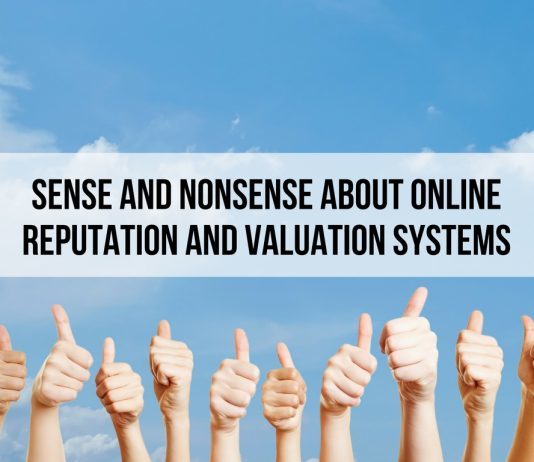
Online valuation systems are overrated. Most systems are flawed and become less and less important as trust in the brands of platforms like Airbnb and Uber grows.
At the time, in 2007, when Brian Chesky and Joe Gebbia came up with the idea of creating an online platform on which anyone could rent a room to a completely unknown tourist, they drew many odd looks. How could you know an overnight guest can be trusted? In the mean time, over 100 million nights have been booked through the platform in 191 countries. I’m talking about Airbnb. The secret: online trust through valuation systems.
Sharing rooms and houses has been existent since time began, but thanks to Airbnb the threshold has been lowered and the activity grows exponentially. There is a growing number of online platforms that link up individuals using the same principles. Uber links up drivers with people who want to travel from A to B and the Dutch SnappCar links up car owners to people who need a car for just a short time. In the Netherlands, already over 140 platforms actively mediate between individuals. Every platform’s promise: Carefree pleasure. Trust is their key.
Trust through online platforms is created in two different ways:
Interpersonal Trust: The trust among users. This is created by personal profiles filled with information about yourself and through reviews of others about you. When you rent a room through Airbnb, you will evaluate the host and he evaluates you afterwards. The more transactions, the better the view on the trustworthiness of users;
Institutional Trust: The trust users have in the system. Platform builders do all they can to ensure problems are avoided and solved as soon as possible. Preventive measures are, for example, profile scans and automatic processes like credit checks to keep people with wrong intentions out. Reactive measures are a valid insurance or a well-reachable customer service. These together create trust in the brand of the platform.
It has to do with both trust in the platform, as well as trust in other users. Valuation systems (e.g. reviews, stars) serve several purposes: they cause bad apples to be quickly removed from the system, they ensure that people will be chosen according to their proven quality, and they enforce certain desired behavior. At the time you misbehave (or you do not behave as per the applicable or desired standard), you’ll be slowly excommunicated and you’ll end up at the sideline.
Online evaluation in practice
How does online evaluation practically work? Most evaluations are based on a 5 star system. Besides this, most platforms offer a possibility to add a certain explanation to your evaluation in a text box.
When you look at the average number of stars in Uber, it appears that the differences between good, medium, and bad aren’t that big at all:
The impact of only one low grade can be big in case you don’t have many evaluations yet. And one low grade lowers the chance that someone else will choose you the next time. Is this current system the ideal?
Let’s take a ride in an Uber taxi as an example. That particular day, you woke up at the wrong side of the bed, the taxi ends up in heavy traffic and you miss out on an important business meeting. Chances are that you will not give this driver a great evaluation. In this example the context is independent of the evaluation.
Another example: A carpenter offers his service on Werkspot.nl. In his first year, as a beginning carpenter, he does not have the same experience as an old hand in the trade. Over the years he develops himself as an expert, though negative reviews of his first year still weigh in his reputation forever. Such a system doesn’t account for any learning curve.
Reputation and valuation 2.0
A party that, in my opinion, has thought things through really well, is the Dutch Meeting Review: a platform to evaluate event venues. They improved online evaluation in four different ways:
Linear depreciation of reviews: a review is depreciated over a time of 4 years. After 1 year it’s weighed by a factor of only 75%, after 2 years 50%, 3 years 25% and the ratio becomes 0% after 4 years. This ensures that your mistake won’t be counted against you forever and your most recent performances contribute the most to your overall evaluation;
Possibility to follow up on a negative review: In the Uber-example, you may imagine that a client calms down and realizes that he has given a too low valuation. At MeetingReview you are allowed to change you evaluation in hindsight.
The feedback loop: As receiver you are allowed to enter into a conversation with your feedback supplier to find a reasonable solution. So, not only a future client will profit, but also the current user of the system. This feedback loop is based on the good intentions of the evaluated person and the insight that he wants to learn from his mistakes;
Manual checks: With a scoring system ranging from 1 to 10, all deviating scores below 5 and higher than 8 are being checked manually. This prevents good friends or competition to affect the average score unjustly.
Such a smart valuation system is an exception at the moment. Most platforms still work with the simplest ratings. Though choices that are made, based on this output, may be drastic.
Added value of interpersonal trust in the future
First of all, more and more often algorithms make the first selection of the supply. With Uber, the algorithm makes a match between you and the taxi. Only afterwards you’re able to see the valuation of the driver. Due to the fact that this car is your fastest option, you’re not likely to decide to cancel this ride. Also on other platforms we see automated linking appear. In Airbnb you’re already able to rent many houses by ‘direct booking’, i.e. without the explicit confirmation of the landlord.
What we see happening is a movement from interpersonal to institutional trust. Ultimately, you trust the platform to have all their scans and checks up and running. And, moreover, that the platform will fix things in case it would go wrong. The role of valuation systems will be moved to the background more and more, and will end up as no more than a control mechanism.
Conclusion
Interpersonal trust played a big role when the institutional trust wasn’t yet developed. In 2007, nobody had heard about Airbnb, there was no trust in the brand, and besides people were asked to do something they had never done before. The interpersonal trust through online profiles played an important, though temporary, role. The ofter we use these kind of platforms, the greater the trust in the institutions behind these sites.
Be honest: What was the last time you asked your favorite airline for the online valuation of the pilot of your airplane? Exactly.
This post was originally posted on the website of Intrapreneur.nl, a knowledge platform of Trivento.
——————————-
Question @RenseC on Twitter : “Doesn’t the fact that eBay reputations are still influential contradict with your theory?”
Answer:
Yes and no. I think that a certain balance between interpersonal and institutional trust will always remain. The question is about the proportion of each of these, and is determined by several factors:
1. The trust and reputation the platforms has developed. Included are elements as trust in the brand, position compared to competition, how screening of users works, if quality checks are in place, what measures are taken when things go wrong, and which securities (e.g. insurances) the platform offers. For example, in case you know that Airbnb excludes every one with a score under 90% from their platform and profiles are filled well, and these elements are evaluated and checked, the necessity to look beyond to the reviews is smaller;
2. The core of the product or the service. Is the product or service standardized? Take a taxi ride through Uber: there are two certain quality standards that provide security (car type, certificate of good conduct, etc.). Besides, the desired behavior (response time, accepted score, etc.) is smartly directed through de app. Therefore it doesn’t matter if driver A or driver B provides you the ride. You want to go from A to B and that’s your reason for choosing the (brand) promises of the platform. Interesting note on the side: maybe the reputation of the demand side will be more important in the future: I’ve seen several Uber forum discussions about the question if you should pick up a client with a score of 4.3, cause it is guaranteed trouble;
3. The transaction taking place with physical contact or not; With a physical meeting (especially outside the personal living space) you’ve got more input on trust and the other party has a harder time not keeping his promises;
4. If the transaction is about a regular thing (taxi ride) or a once in a lifetime transaction (purchase of some product on eBay);
5. If an algorithm provides the match. In other words: are you able to make a choice based on the full supply, or does a algorithm provide you a match and does the profile only serve you to possibly refuse the choice made for you;
6. Choice: if there is (like traveling with BlaBlaCar from Utrecht to Brussels about noon tomorrow) not much to choose from, you’ll be less picky;
7. Urgency: do you need something fast, or may it wait for a bit;
8. What are you about to lose, when something goes wrong?
9. Probably, I’ll think of some more reasons later on 
Wil jij ook naar het sprookjesbos?
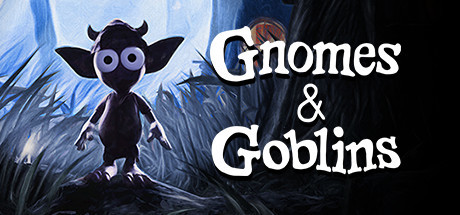
Dat vond ik heel vroeger altijd zo cool, het sprookjesbos. Ergens in de buurt van Groningen, waar ik opgroeide, had je er eentje. Waar precies weet ik niet, dat zal ik es moeten navragen aan mijn moeder. Want dat weet ik echt niet meer. Maar dat is allemaal eigenlijk niet zo belangrijk, want gisteren ben ik ook in een soort sprookjesbos geweest. Het ontstond zo, het was niet gepland. Na een lang intens gesprek wilde ik wel even naar een andere wereld. En hey, dat kan gewoon! Helemaal met de HTC Vive die sinds recentelijk wordt gedeeld in het Permanent Future Lab….
“Je hoeft niet naar de Efteling voor het sprookjesbos” aldus Jurjen. “Kijk, check nou maar even deze Gnomes & Goblins virtual reality app en zet die VR nou op je kop!” Dat zei hij vast iets liever, maar zo heb ik het nog in mijn gedachte. En diezelfde gedachte, of mijn brein, daar gebeurde gisteren nogal wat mee……
De wereld die ik namelijk in die VR bril zag… Zo virtueel, zo nep, maar toch ook zo echt….. daar genoot ik intens van. Niet alleen tijdens het spelen van die app, maar ook in de uren erna. De rest van de dag kreeg ik af en toe de beelden weer voor me. Een prachtige wereld waar je van alles in kan ontdekken en daarna gewoon op kan voortboorduren. Ik ben om en dat heb ik niet zo heel snel, want ik ben niet echt een echte gamer. Ik wacht met alle smart op de volledige release van deze game, want die is nog niet eens uit.
Misschien is hierdoor Permanent Future Lab inderdaad leuker dan de Efteling, zoals een paar bekende jonge bezoekers dat ooit blij riepen. Ik zou zeggen, zoals altijd: wees ook welkom in pretpark 3.0!
Twijfel je nog? Kom gewoon dan es checken. En ik verzeker je, het is veel leuker om zelf over het tapijt te kruipen en gekke dingen te doen dan wanneer je het mij ziet doen.
bron foto: http://store.steampowered.com/app/490...
The post Wil jij ook naar het sprookjesbos? appeared first on Seats2meet.
March 10, 2017
Kennismaken met Ondernemers Onder Elkaar

Uit de samenwerking tussen Seats2meet, De Zaak, MAKRO Nederland, Team Academy en Fuenta is een bijzonder ondernemerscollectief ontstaan, namelijk Ondernemers Onder Elkaar (OOE). Bijzonder, omdat het een verrassende verbinding tussen oude en nieuwe economie is. Bijzonder, omdat het een mooie combinatie van slagkracht en vernieuwing is. Vijf zeer verschillende partijen, met echter allemaal hetzelfde hoogste doel: jou als ondernemer optimaal faciliteren in jouw persoonlijke en zakelijke ontwikkeling.
Jij snapt dat ondernemerschap begint bij visie, verbinding, kennis & vaardigheden. Dat je je eigen boontjes moet doppen, maar tegelijkertijd niet zonder een goed netwerk kunt. Dus faciliteren we jou met locaties om te (net)werken en vergaderen en organiseren we graag onverwachte maar relevante ontmoetingen voor je met anderen. Verder bieden we je inspiratie, kennis, tooling, content en een breed evenementenprogramma om jouw kennis en vaardigheden up-to-date te houden. Zo kun jij je als ondernemer onderscheidend blijven neerzetten in een snel veranderende wereld. Of je nu een starter of een ervaren ondernemer bent.
Geef ons even de tijd om ons aanbod naar jou verder vorm te geven op www.ondernemersonderelkaar.nu. Het collectief is echt ‘a work in progress’! Maar… je kunt al iets van Ondernemers Onder Elkaar meekrijgen tijdens de 12 TV-uitzendingen van Z in Zaken, elke vrijdag vanaf 10 maart, 16:30-17:30 uur op RTLZ. So tune in! We gaan een mooi netwerk bouwen, hopelijk ook met jou. Waarin jij nét dat beetje meer krijgt als ondernemer als je je aansluit bij het collectief.
Om de daad bij het woord te voegen, bieden we je gelijk een cadeautje aan, namelijk een ticket (ter waarde van €37,50) voor het evenement TopTrends in Business, dat vier keer plaatsvindt op verschillende locaties in het land vanaf 28 maart a.s. Tijdens dit evenement worden de 3 megatrends flexibilisering, digitalisering en duurzame groei, vertaalt naar 9 praktische TopTrends die jouw business gaan verbeteren.
Je krijgt een masterclass van twee trendwatchers, Willem Overbosch (auteur boek TopTrends in Business en CEO van MKB-Servicedesk en De Zaak) en Ronald van den Hoff (auteur boek Society 3.0 en mede-oprichter Seats2meet). Je leert bovendien gelijk hoe je het toepast op je eigen bedrijf door middel van het invullen van het Trendcanvas, onder leiding van Chantal Verweij (oprichter Inspiratiebrigade.nl). Tijdens de aansluitende netwerkborrel laten we ons lekker verwennen met hapjes en drankjes van MAKRO.
Voor meer info over het evenement en het verzilveren van je cadeautje, klik snel hier!
The post Kennismaken met Ondernemers Onder Elkaar appeared first on Seats2meet.
March 9, 2017
Taal doet meer & Seats2meet for Locals
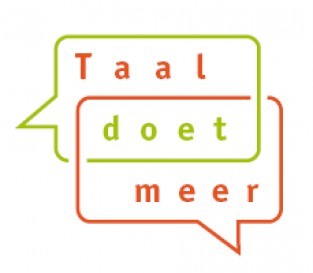
Heb je wel eens een nieuwe taal geleerd?
Herken je dat gevoel dat er langzaam een brei van woorden in je hoofd ontstaat en dat je jezelf verbaasd tijdens het luisteren van muziek de tekst ineens na kan zingen en ook daadwerkelijk begrijpt?
Een taal verbind. Met taal kom je dichter bij elkaar.
Taal doet meer zorgt er met ruim 600 vrijwilligers per jaar voor dat Utrechters kunnen meedoen in de samenleving. Het leren van de Nederlandse taal is een rode draad in ons werk. Taal is nodig om een baan te vinden, met de leerkracht van je kinderen te praten, naar de huisarts te gaan, met een computer te werken of je huiswerk te maken.
Doormiddel van allerlei verschillende activiteiten waarbij “Taal” centraal staat helpt Taal doet meer om nieuwkomers in Nederland de taal eigen te maken.
In samenwerking met Seats2meet for Locals, wordt er vandaag een wandeling door Utrecht en volgende week een krachtavond in Seats2meet Utrecht CS samen met Taal doet meer georganiseerd.
Vandaag zijn we met een groep van 50 in totaal. 25 nieuwkomers en 25 vrijwilligers die zich via NL Doet hebben aangemeld. We beginnen met een korte Turkse taalcursus. Om iedereen hetzelfde gevoel te laten ervaren hoe het voelt om een nieuwe, totaal vreemde, taal te leren. We starten bij de Social Impact Factory in Utrecht. Vervolgens gaan we de stad in. Een wandeling door de binnenstad waarbij in buddy’s korte taaloefeningen worden gedaan.
Iedereen is welkom tijdens de krachtavond van 15 Maart van 18:00 tot 21:00! Wil jij erbij zijn? En verschillende culturen, talenten en verhalen ontdekken en je kennis, netwerk en talenten delen? We vragen iedereen zelf een hapje eten te maken/mee te nemen (dit werkt meteen als ijsbreker) Wat neem jij mee?
Meer informatie over de krachtavond vind je op onze facebook!
The post Taal doet meer & Seats2meet for Locals appeared first on Seats2meet.
March 7, 2017
How corporates can benefit from Serendipity

The search for a spot in the light in a fast changing world have been a big topic along directory boards all over the world. That leads executives on reflecting what needs to be changed. Is it the approach to the client? The transparency? Being more “green”? All of them have been approached along the new way of working.
Caring for your employees needs is no longer exclusive to tech companies. More and more companies are letting go of suit and ties. As a result they explore the benefits of a more human work environment. For an instance, EY, one of the biggest consultancy firms in the world is now adopting flex working. Gerdau, a steel producer, is another unexpected case. They let go of the desks, ties and 9 to 5 work time while replacing them with sofas, shorts and flex work times.
Beyond dressing rules, flexible times, sofas, nap pods, free food and ping pong tables there is the social factor. They all represent a trend. Because of all the option employees become autonomous and self steering. More than ever it is important to know how to prioritise and in order to know this, is important to have an aligned vision. But how can a company with thousands of employees make sure all of them have the same vision? Hence the importance of being connected. Instead of just sitting in a desk from 9 to 5, it is important to create an ecosystem where everyone feels being a part of and responsible for. Now here are the how the power of unexpected relevant encounters, also known as serendipity, can help creating an ecosystem.
Optimising knowledge and skills
I worked in one of the biggest media companies of the world for 4 year. The company employs 10.000 people worldwide. That makes it pretty hard to get to know everyone who works there. Now imagine getting to know what everyone is up to and what are their hidden talents. That’s where serendipity and matchmaking could give a little hand. By matching what you are working today with the tags the employees chose, and not what their job description says, you can find help in unexpected place. It is also important to see that it gives employees who are looking to learn something different opportunities. That’s how you optimise knowledge and skills inside a organisation.
Co-creating and letting innovation in
While you can discover new talents and skills inside an existing organisation, the way to let innovation in is by opening your doors. Achmea, one of the biggest insurance companies in the Netherlands, has been giving a show with LAB 55. It is an open space inside their headquarters in Apeldoorn. There, freelancers and entrepreneurs are welcome to work and connect. In monthly events they are welcome to pitch their ideas to Achmea itself. Was with this initiative that Achmea started collaborating with 46 local entrepreneurs and start ups, accelerating innovation and creating an ecosystem.
Creating culture and an ecosystem
Some people might forget that who makes the work inside an office are human beings. Yes, actual human beings. People like you and me. Social beings that enjoy to laugh, exchange ideas, have good conversations, being creative and having fun. Encouraging serendipity is about encouraging being social and being human, not a robot who is only there to exercise a single job description. Because of that perception it is so important to focus in ecosystem and sharing values consequently creating a culture. People are looking for more than a good salary, but for a purpose and a balanced lifestyle. It is important to acknowledge the humanity of corporations and make the best out of it. That envolves everyone around it: its employees, vendors, partners, investors, families, the community in which it is in. The way to do it? Invite them in and connect.
The post How corporates can benefit from Serendipity appeared first on Seats2meet.
March 6, 2017
Playing on the Edge: Opportunities on the New Internet

Every a few years the Internet changes significantly enough to deserve a change in notation. The first wave was about using web pages to sell products. In the second phase, the Internet became a democracy in that people could comment on and challenge what was written in the emerging web pages and micro-blogging sites. Web 2.0 brought the social media age of the Internet to maturity. Currently, it is changing once more. These new adjustments are building on the success of web 2.0 and focus on creation, or rather co-creation.
Co-Creation
Co-creation refers to the involvement of users in the development of a product. The concept builds on the realization that people are no longer content with just commenting; they want to be part of the actual process that creates a product. Co-creation, therefore, is a concept of innovation.
Exploiting Co-Creation
There are three main possible applications of co-creation. These are the evaluation of ideas, refining of concepts, and designing of product prototypes. Companies that use the co-creation approach do so for the benefits that include efficient innovation, customer engagement and reduced marketing costs as the users help them to come up with the ideas.
Some companies that have successfully used co-creation include Coca-Cola with its Freestyle Machine that has an internet sharing component, apparel company Threadless which only manufactures t-shirt designs that have the highest votes from users, and LEGO which has a vibrant community supporting innovative growth of their product.
Where Do You Fit In?
If you have any specialized expertise, you can be a co-creator who makes profits. Think of that as an interesting proposition if you wish to work remotely for a big company – you would only get paid when the company makes sales. A good example of this opportunity is with power-tool manufacturer DeWALT which has two large co-creation models. The first one is a community made up of regular users of the tools who might have suggestions on the products and the second one is an initiative that invites submissions from professionals. If a submission wins, the person who wrote it gets paid for it. This is a new way of making money from home that many individuals are now aware of.
The opportunities to make money within a co-creation ecosystem are there, but they require that people demonstrate and apply their unique abilities.
Image source: https://unsplash.com/photos/loAgTdeDcIU
The post Playing on the Edge: Opportunities on the New Internet appeared first on Seats2meet.
Empowering Society 3.0 als Ambtenaar
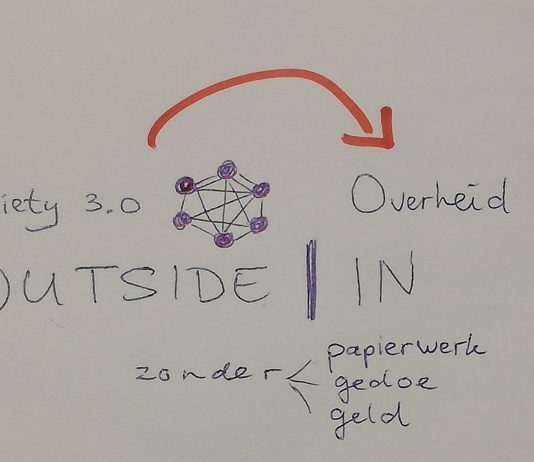
Kan dat? Society 3.0 empoweren als ambtenaar? De overheid wordt vaak bestempeld als die logge organisatie waar alles gebeurt met te veel geld, stapels papierwerk en onnodig gedoe. Maar is dat echt zo? Zo ja, kan dat dan allemaal niet worden gekanteld? Of is het echt een te groot bolwerk van “zombies”, zoals er wel es wordt geroepen door een aantal bij Seats2meet. Ik wil het wel eens gaan ontdekken, en hoe….. deze week ga ik aan de slag als ambtenaar.
Aan de slag als ambtenaar
De mensen die me kennen, zullen wel denken: hè, maar jij laat dingen toch het liefst spontaan gebeuren, zonder geld, zonder papierwerk en zonder gedoe*? Yes, daar sta ik zeker voor: decentraliseren, mensen verbinden, deeleconomie, lekker klooien en vooral lekker doen zonder teveel plannen. Dat soort doe-processen en meer van dat alles heb ik geleerd nadat ik 3 jaar geleden Seats2meet kwam binnenwandelen. Heel veel gebeurde sindsdien op basis van de kracht van toeval, waar ik al een keer wat over deelde. Maar wat is nou het mooie? Mijn nieuwe baan als ambtenaar ontstond ook door die “force of serendipity”. Namelijk, tijdens een kennismakingsgesprek zo’n 3 week geleden.
Aanleiding van het gesprek
Via Hong-Ling Chi kwam ik daar terecht. Hong-Ling introduceerde ik zo’n 1,5 jaar geleden aan Permanent Future Lab en het ecosysteem van Seats2meet. Ze wilde wel eens de Muse hersenscanner testen vanwege haar interesse in mindfulness. Kort nadat ze de Muse ontdekte ging ze aan de slag bij i-interim rijk (binnen de Rijksoverheid dé organisatie waar medewerkers zich inzetten om grote, complexe en zeer uitdagende ICT programma’s en projecten succesvol te laten verlopen).
Al geruime tijd vond Hong-Ling dat ik moest kennismaken met haar team. Omdat dat ergens wel een meerwaarde zou hebben. Nadat UBR (Uitvoeringsorganisatie Bedrijfsvoering Rijk, waar i-interim rijk onderdeel van is) kort geleden een intern lab opende en Hong-Ling met ambtelijke collega’s kwam buurten bij de Tech Tuesday van januari moesten we echt maar es wat inplannen. Maar hoe elkaar precies te versterken? Daar had ik geen concreet idee bij. Ik zou het wel gaan zien.
Een dynamische kennismaking
Samen met Bart Roorda (detail: ooit ontmoet bij S2M den Haag) besloot ik om een korte algemene presentatie te houden over onszelf en de communities waar we actief in zijn: Permanent Future Lab, Permanent Beta en Seats2meet. Op 15 februari, een dag na de Tech Tuesday van februari, was het dan zo ver. In de ochtend om 8:30. Lekker vroeg dus, want die maandelijkse Tech Tuesday stopt nooit voor 12 uur ‘s nachts.
Het was een dynamische kennismaking met maar liefst 6 aanwezigen. Zo vlak voor het einde van het gesprek had ik nog geen idee hoe het zou worden afgerond voor een eventueel vervolg. Tot ieders verbazing werden Bart en ik plots gevraagd of we beschikbaar waren. In de vorm van een baan. Ik ontdekte achteraf dat mijn agenda best heel vol zit met allemaal leuk dingen. Toch besloot ik op dat moment om het aanbod met beide handen aan te grijpen. Voor 3 dagen intern in de week en flexibel in te richten, dat wel. Anders kan mijn creatieve geest dat echt niet aan. Daarnaast ga ben ik 1 dag on the road, oftewel dan ga ik doen wat ik altijd al deed, maar dan vanuit het rijk.
Wat ik allemaal ga meemaken? Ik weet het nog niet precies. Ga ik aan de slag met het lab? Ja, dat is het de bedoeling. Weet ik dan hoe die er uit ziet dan? Nee. Maar dat komt vast wel goed…
Intrinsieke motivatie
Waarom ga ik daar nou echt aan de slag? De voornaamste reden dat ik voor deze stap kies is heel simpel: vertrouwen, het vertrouwen die ik kreeg om tijdens een kennismakingsgesprek gevraagd te worden om dingen te doen die ik nu ook al meer dan 3 jaar doe, maar dan intern als ambtenaar. Het vertrouwen dat ik nooit kreeg toen ik ooit meer dan 400x tevergeefs solliciteerde naar ‘oude wereld’ baantjes voordat ik Seats2meet binnenwandelde.
Ik heb het dan ook maar even voor de zekerheid gedubbelcheckt met Diederik van Leeuwen (domein directeur van i-interim rijk en programmamanager van UBR) die me de baan aanbood. Want ik moest me even bedenken: “dus ik kan kan gewoon mijn passie uitvoeren en helemaal mezelf zijn?” Nou en dat kan dus!
Tot nu toe is alles zeer soepel verlopen. Over het “aannamebeleid” ben ik zeer te spreken want die ging hartstikke snel. Sterker nog, 1 maart kon ik al beginnen. Maar vanwege mijn geplande vakantiedagen is het 7 maart geworden. Naast het vertrouwen is er overigens nog een belangrijke reden waarom ik deze uitdaging aanga. Ik snap namelijk zelf nog niet zoveel van het gehele overheidsapparaat. En daar kan ik wel es blij van worden met “mijn blik van verbazing, observatie en vermaak”, zoals Bart dat zo mooi omschreef.
Hou me in de gaten
De komende 6 maanden ga ik voor 4 dagen in de week bij de Rijksoverheid aan de slag, met het V lab. Daarnaast blijf ik ondernemen en me inzetten voor Permanent Future Lab. Ook al heb ik van een aantal gehoord: “Wow, wat een move” tot “Ja, dit past helemaal bij jou” wil ik ook jou graag het volgende vragen: mocht je mij de komende tijd eens (online) tegenkomen, tik je me dan aan voor een zombie reality check?
PS “Zonder geld, papierwerk en gedoe” Zo werk ik veel, maar die tagline komt eigenlijk van Permanent Beta, dus dat vermeld ik graag even netjes
PPS Bart Roorda is nog niet concreet in gesprek gegaan voor een baan, binnenkort gaat hij wel op bezoek om samen vernieuwende blockchain mogelijkheden te bespreken.
PPPS De volgende Tech Tuesday vindt plaats op 14 maart, meld je hier aan
PPPPS Ze komen niet in het bovenstaand verhaal voor, maar er hebben meer mensen mee gedacht of en hoe ik deze innovatieve zombie uitdaging wel moet aangaan zoals: Jurjen de Vries, Fanny Claassen en Jeroen Bartelse. Thanks 



